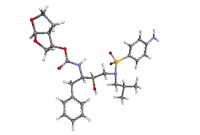Darunavir
 |
|
 |
|
| Clinical data | |
|---|---|
| Trade names | Prezista, Prezcobix, others |
| AHFS/Drugs.com | Monograph |
| MedlinePlus | a607042 |
| Pregnancy category |
|
| Routes of administration |
by mouth |
| ATC code | |
| Legal status | |
| Legal status | |
| Pharmacokinetic data | |
| Bioavailability | 37% (without ritonavir), 82% (with ritonavir) |
| Protein binding | 95% |
| Metabolism | hepatic (CYP3A4) |
| Biological half-life | 15 hours |
| Excretion | Faeces (80%), urine (14%) |
| Identifiers | |
|
|
| Synonyms | TMC114 |
| CAS Number | |
| PubChem CID | |
| DrugBank | |
| ChemSpider | |
| UNII | |
| KEGG | |
| ChEBI | |
| ChEMBL | |
| NIAID ChemDB | |
| ECHA InfoCard | 100.111.730 |
| Chemical and physical data | |
| Formula | C27H37N3O7S |
| Molar mass | 547.665 g/mol |
| 3D model (Jmol) | |
|
|
|
|
|
|
|
Darunavir (DRV), sold under the brand name Prezista among others, is an antiretroviral medication used to treat and prevent HIV/AIDS. It is generally recommended for use with other antiretrovirals. It is often used with low doses of ritonavir or cobicistat to increase darunavir levels. It may be used for prevention after a needlestick injury or other potential exposure. It is taken by mouth once to twice a day.
Common side effects include diarrhea, nausea, abdominal pain, headache, and rash. Severe side effects include allergic reactions, liver problems, and skin rashes such as toxic epidermal necrolysis. While poorly studied in pregnancy it appears to be safe for the baby. It is of the protease inhibitor (PI) class and works by blocking HIV protease.
Darunavir was approved for medical use in the United States in 2006. It is on the World Health Organization's List of Essential Medicines, the most effective and safe medicines needed in a health system. As of 2015 it is not available as a generic medication. The wholesale cost in the developing world is about 66 USD per month. In the United States it costs more than 200 USD per month.
Darunavir is an OARAC (DHHS) recommended treatment option for adults and adolescents, regardless of whether they have received HIV treatment in the past. In a study of patients that had never received HIV treatment, darunavir was as effective as lopinavir/ritonavir at 96 weeks with a once-daily dosing. It was approved by the FDA on October 21, 2008 for people not previously treated for HIV. As with other antiretrovirals, darunavir does not cure HIV/AIDS.
...
Wikipedia
